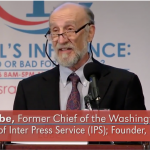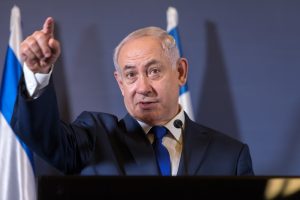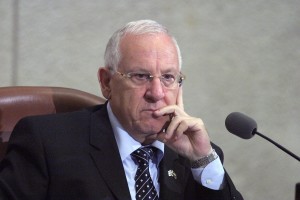While Iran hawks, such as Jennifer Rubin and David Frum, and Israeli Prime Minister Benjamin Netanyahu have been quick to push the story that WikiLeaks cables prove “linkage”—specifically that curbing Iran and resolving the Israeli-Palestinian conflict are inextricably linked—is an irrelevant concept for explaining the Middle East’s regional dynamics and the U.S.’s relations with Gulf countries.
Jim Lobe and I took a closer look at the cables and found ample evidence that Arab leaders consistently mentioned the Israeli-Palestinian conflict as the biggest impediment to countering Iran’s growing regional influence.
Indeed, as documented in our article, diplomats from the UAE, Jordan, Egypt and Qatar made statements which clearly endorsed linkage.
The Crown Prince of Abu Dhabi and Deputy Supreme Commander of the UAE Armed Forces Sheikh Mohammed bin Zayed al Nahyan, in a December 9, 2009 meeting with the U.S. Deputy Secretary of Energy Daniel Poneman:
Emphasized the strategic importance of creating a Palestinian State (i.e., resolving the Israeli- Palestinian conflict) as the way to create genuine Middle Eastern unity on the question of Iran’s nuclear program and regional ambitions.
Gamal Mubarak, son of Egyptian president Hosni Mubarak was described in a May 27, 2008 as telling Rep. Jeff Fortenberry:
“Egypt and Saudi Arabia, as well as Jordan, are the ‘heavyweights’ that can counter Iran.”
The cable goes on to describe Mubarak as:
Advocat[ing] movement on the Israeli/Palestinian track to remove a prime issue that Iran can use as a pretext
A cable from the U.S. embassy in Amman, written shortly after the end of the Gaza War in January 2009, reads:
Speaking to PolOffs [political officers] in early February 2009, immediately after the Gaza War, Director of the Jordanian Prime Minister’s Political Office Khaled Al-Qadi noted that the Gaza crisis had allowed Iranian interference in inter-Arab relations to reach unprecedented levels.
An April 2, 2009 cable from Amman repeated the Jordanian position.
Jordanian leaders have argued that the only way to pull the rug out from under Hizballah – and by extension their Iranian patrons – would be for Israel to hand over the disputed Sheba’a Farms to Lebanon.
It went on,
With Hizballah lacking the ‘resistance to occupation’ rationale for continued confrontation with Israel, it would lose its raison d’etre and probably domestic support.
And a February 22, 2010 cable, describes UAE foreign minister Sheikh Abdullah bin Zayed Al Nayan warning a Congressional delegation led by Nita Lowey against a military attack on Iran.
The cable remarks that bin Zayed:
Concluded the meeting with a soliloquy on the importance of a successful peace process between Israel and its neighbors as perhaps the best way of reducing Iran’s regional influence.
While Jennifer Rubin writes that the cables have shown that Obama misrepresented to the American people that “the non-peace talks are necessary to curb the Iranian threat,” and David Frum writes that, “Governments in the region do not in fact care very much about the Israeli-Palestinian dispute,” our examination of the cables reveals the extent to which Iran hawks must go to claim that Arab leaders don’t buy into the concept of linkage.
Indeed, even Netanyahu espoused this rather backward reading of the WikiLeaks cables.
He told a media conference in Tel Aviv, immediately after the first WikiLeaks were released:
[T]here is a gap between what is said by leaders in private and what they say in public, especially in our region, because our region is hostage to a narrative, and that narrative is the result of nearly 60 years of propaganda. In this narrative, the single greatest threat to regional peace and to the region’s future is the Israeli-Palestinian conflict and Israel’s alleged aggression.
The Obama administration and the U.S. military leadership appear to embrace the concept of linkage. So too do Arab leaders, when speaking in private with U.S. diplomats. Despite the misrepresentations of the WikiLeaks cables by American Iran Hawks and Israeli Prime Minister Benjamin Netanyahu, it’s becoming increasingly obvious that voices opposing linkage represent an increasingly small minority of people who deny the fundamental truths of the linkage argument.
During a February 14, 2010, meeting with Senate Foreign Relations Committee chairman John Kerry, Qatar Emir Hamad bin Khalifa Al-thani suggested one reason that Israel might be hyping the threat of a nuclear Iran.
The cable summarizes bin Khalifa as saying:
[The Israelis] are using Iran’s quest for nuclear weapons as a diversion from settling matters with the Palestinians.





Good for you guys for extracting this stuff from the cables and putting this whole business into some kind of context.
And, the over-ridding context should be that all these wiki-leaks are seen through the filter of US diplomats arguing to the US political class. One constant is the US-centered bias. Hypocrites are very often un-aware of their double standards.